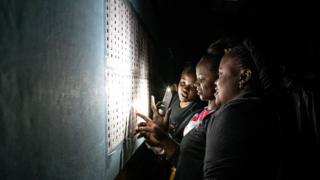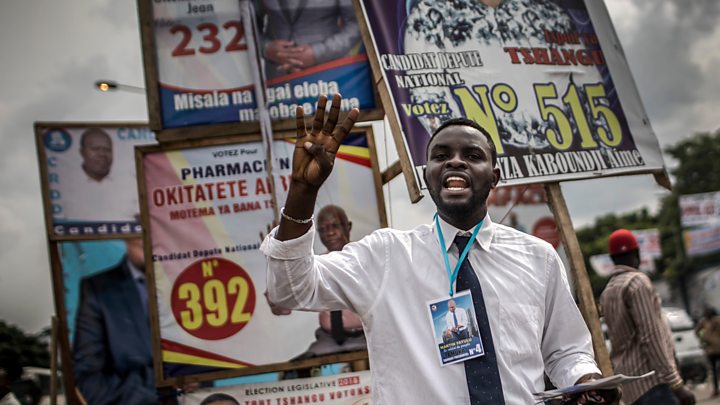DR Congo election: Observers complain of irregularities
 AFP
AFP
Election observers and the opposition in the Democratic Republic of Congo say Sunday's presidential election was marred by widespread irregularities.
The Roman Catholic Church's observer team said it had received more than 500 reports of malfunctioning voting machines.
The opposition accused the military of trying to coerce people to vote for the ruling's party's candidate.
President Joseph Kabila insisted the election was free and fair.
He is due to step down after 17 years in office, and has promised DR Congo's first orderly transfer of power since it gained independence from Belgium in 1960.
Counting is under way and provisional results are expected on 6 January.
Mr Kabila is backing his former interior minister Emmanuel Ramazani Shadary, who is the ruling's party's candidate.
The two main opposition candidates are Martin Fayulu, a former oil executive, and Felix Tshisekedi, the son of the late veteran opposition leader Etienne Tshisekedi.
Reuters
It added that around 20% of polling stations opened late, and there were reports of polling stations being moved at the last minute.
About 40% of the population in DR Congo is Catholic, and Pope Francis had appealed for a peaceful vote.
Mr Fayulu warned that the irregularities would have a negative impact on the electoral process.
In a BBC interview, he also accused the military of "pushing" voters in some areas to cast their ballots for Mr Shadary.
An internal UN report said armed rebels in eastern Masisi attempted to intimidate people to vote for Mr Shadary, reports the BBC's Louise Dewast from the capital, Kinshasa.
Mr Tshisekedi accused Mr Kabila's government of creating a "mess" on election day in order to trigger legal challenges that would help the president remain in power.
"I deplore all the disorder that we hear about," he said.
In a television appearance after voting ended, Mr Kabila praised the electorate for voting "in peace and dignity", AFP news agency reports.
 Media playback is unsupported on your device
Media playback is unsupported on your device
He was supposed to step down two years ago, but the election was postponed after the electoral commission said it needed more time to register voters.
AFP
The run-up to the poll was also hit by controversy over the exclusion of some 1.26 million out of an electorate of nearly 40 million from voting.
The electoral commission said voting could not take place in the eastern cities of Beni and Butembo because of a deadly Ebola outbreak in the region. Voting was also called off in the western city of Yumbi because of insecurity there.
In some areas in the east where the poll was cancelled, activists organised their own election, dubbed "citizen votes".
They used ballot boxes from the 2011 elections and printed their own voting papers.
"We want to show the Ceni [electoral commission] that if they fail to organise elections here because of Ebola, we can do it," organiser Katembo Malikidogo told the BBC.
AFP/Reuters


Comments